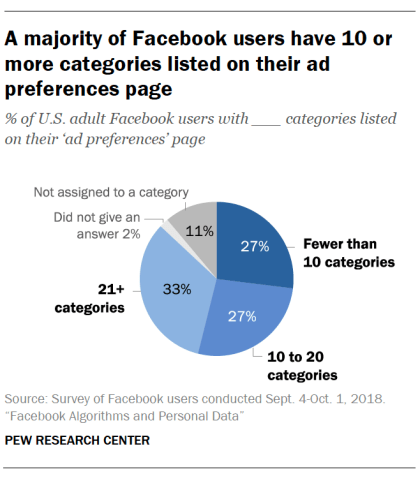Facebook Algorithms and Personal Data

Most commercial sites, from social media platforms to news outlets to online retailers, collect a wide variety of data about their users' behaviors. Platforms use this data to deliver content and recommendations based on users' interests and traits, and to allow advertisers to 
Facebook makes it relatively easy for users to find out how the site's algorithm has categorized their interests via a “
A second survey of a representative sample of all U.S. adults who use social media – including Facebook and other platforms like Twitter and Instagram – using Pew Research Center's 
Some six-in-ten Facebook users report their preferences page lists either 10 to 20 (27%) or 21 or more (33%) categories for them, while 27% note their list contains fewer than 10 categories.
Those who are heavier users of Facebook and those who have used the site the longest are more likely to be listed in a larger number of personal interest categories. Some 40% of those who use the platform multiple times a day are listed in 21 or more categories, compared with 16% of those who are less-than-daily users. Similarly, those who have been using Facebook for 10 years or longer are more than twice as likely as those with less than five years of experience to be listed in 21 or more categories (48% vs. 22%).
74% of Facebook users say they did not know about the platform's list of their interests

About three-quarters of Facebook users (74%) say they did not know this list of categories existed on Facebook before being directed to the page in the Center's survey, while 12% say they were aware of it.
Yet even with a majority of users noting that Facebook at least somewhat accurately assesses their interests, about half of users (51%) say they are not very or not at all comfortable with Facebook creating this list about their interests and traits. This means that 58% of those whom Facebook categorizes are not generally comfortable with that process. Conversely, 5% of Facebook users say they are very comfortable with the company creating this list and another 31% declare they are somewhat comfortable.
There is clear interplay between users' comfort with the Facebook traits-assignment process and the accuracy they attribute to the process. About three-quarters of those who feel the listings for them are not very or not at all accurate (78%) say they are uncomfortable with lists being created about them, compared with 48% of those who feel their listing is accurate.
Facebook's political and 'racial affinity' labels do not always match users' views
It is relatively common for Facebook to assign political labels to its users. Roughly half (51%) of those in this survey are given such a label. Those assigned a political label are roughly equally divided between those classified as liberal or very liberal (34%), conservative or very conservative (35%) and moderate (29%).
Among those who are assigned a label on their political views, close to three-quarters (73%) say the listing very accurately or somewhat accurately describes their views. Meanwhile, 27% of those given political classifications by Facebook say that label is not very or not at all accurate.
There is some variance between what users say about their political ideology and what Facebook attributes to them.3 Specifically, self-described moderate Facebook users are more likely than others to say they are not classified accurately. Among those assigned a political category, some 20% of self-described liberals and 25% of those who describe themselves as conservative say they are not described well by the labels Facebook assigns to them. But that share rises to 36% among self-described moderates.
In addition to categorizing users' political views, Facebook's algorithm assigns some users to groups by “multicultural affinity,” which the firm says it assigns to people whose Facebook activity “aligns with” certain cultures. About one-in-five Facebook users (21%) say they are assigned such an affinity.
The use of multicultural affinity as a tool for advertisers to exclude certain groups has created controversies. Following pressure from Next: Acknowledgments

